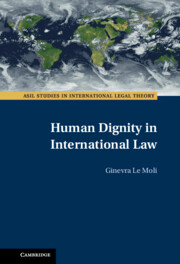Book contents
- Human Dignity in International Law
- ASIL Studies in International Legal Theory
- Human Dignity in International Law
- Copyright page
- Dedication
- Contents
- Figures
- Acknowledgements
- Table of Instruments
- Table of Cases
- Abbreviations
- Introduction
- 1 Analytical Framework
- 2 Two Circles of Dignity
- 3 Three Constitutive Stages
- 4 Human Dignity in International Humanitarian Law
- 5 Human Dignity in Human Rights Law
- 6 Human Dignity in International Criminal Law
- 7 Bridging Narratives
- Select Bibliography
- Index
6 - Human Dignity in International Criminal Law
Published online by Cambridge University Press: 12 May 2022
- Human Dignity in International Law
- ASIL Studies in International Legal Theory
- Human Dignity in International Law
- Copyright page
- Dedication
- Contents
- Figures
- Acknowledgements
- Table of Instruments
- Table of Cases
- Abbreviations
- Introduction
- 1 Analytical Framework
- 2 Two Circles of Dignity
- 3 Three Constitutive Stages
- 4 Human Dignity in International Humanitarian Law
- 5 Human Dignity in Human Rights Law
- 6 Human Dignity in International Criminal Law
- 7 Bridging Narratives
- Select Bibliography
- Index
Summary
Chapter Six explores the third and last constitutive stage of human dignity in international criminal law. Human dignity’s first manifestations coincide with the adoption and entry into force of the Hague Law (1899 and 1907) and the largely symbolic, in retrospect, Article 227 of the 1919 Treaty of Versailles, under which the German Kaiser was to be brought to justice, although that did not happen. In 1945, with the Nuremberg Statute, human dignity is unequivocally enshrined in legal form, both in the definition of international crimes, including ‘against humanity’, and in the necessary corollary of an international prosecution of such crimes. The institutional and legal criminal framework of the 1990s, however, provides a more solid basis for the consolidation of human dignity through international criminal law, vesting it with an actionable nature. Aside from the expansion of conflict-specific international tribunals, the conclusion in 1998 of the Rome Statute establishing a general International Criminal Court, defining both crimes and institutional processes for the prosecution, consolidates the incremental approach prevailing until them in international criminal law.
Keywords
- Type
- Chapter
- Information
- Human Dignity in International Law , pp. 269 - 305Publisher: Cambridge University PressPrint publication year: 2021

